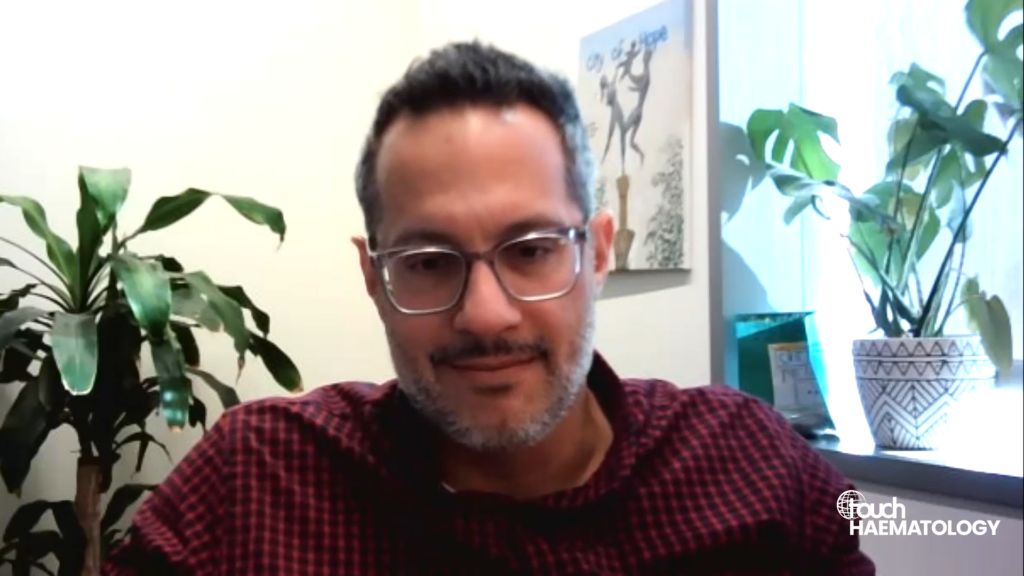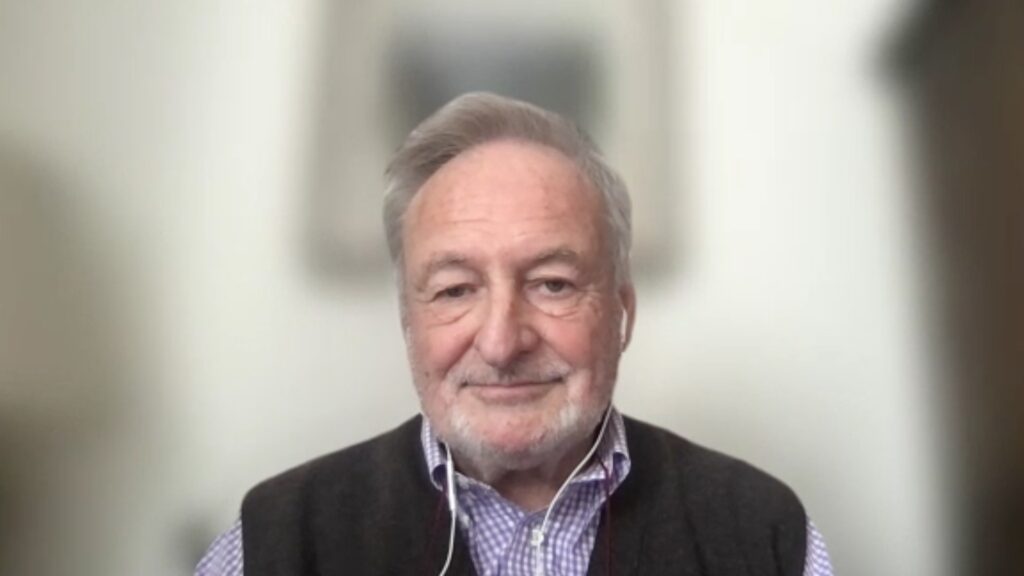touchHAEMATOLOGY coverage of data presented at EHA 2024:
The APOLLO trial investigated the efficacy of combining all-trans retinoic acid (ATRA) and arsenic trioxide (ATO) versus the standard of care, ATRA and chemotherapy (CHT) in high-risk acute promyelocytic leukaemia (HR-APL). Despite early study termination due to the COVID-19 pandemic, 131 patients were analyzed. Results showed that ATRA-ATO achieved a 2-year event-free survival (EFS) of 89%, compared to 72% for ATRA-CHT. Both regimens had similar early death rates, but molecular relapse occurred only in the ATRA-CHT group. ATRA-ATO with initial idarubicin doses demonstrated superior outcomes, suggesting potential as a new standard for HR-APL.
Prof. Uwe Platzbecker presented the abstract “First Results Of The APOLLO Trial: A Randomized Phase III Study To Compare ATO Combined With ATRA Versus Standard AIDA Regimen For Patients With Newly Diagnosed, High-Risk Acute Promyelocytic Leukemia” (Abstract S102) at the 29th European Hematology Association (EHA) 2024 Congress on 13–16th June 2024 in Madrid, Spain.
Questions:
- Please can you give us the background and rationale behind the APOLLO trial and its focus on unmet needs in high-risk acute promyelocytic leukaemia (HR-APL)? (0:12)
- What were the primary and secondary endpoints of the APOLLO trial? (1:42)
- What is the significance of the findings regarding event-free survival (EFS) and overall survival (OS)? (2:32)
- What were the safety outcomes observed in the APOLLO trial, particularly in terms of early death rates and adverse events in both treatment groups? (3:30)
- Given the results of the APOLLO trial, how do you see the future of HR-APL treatment evolving? Is there potential for ATRA-ATO to become the new standard of care? (5:08)
References:
- Lo-Coco F, G. Avvisati G, Vignetti M, et al. Retinoic Acid and Arsenic Trioxide for Acute Promyelocytic Leukemia. New Engl J Med. 2013;369:111–21.
- Platzbecker U, Della Porta MG, Santini V, et al. Efficacy and safety of luspatercept versus epoetin alfa in erythropoiesis-stimulating agent-naive, transfusion-dependent, lower-risk myelodysplastic syndromes (COMMANDS): interim analysis of a phase 3, open-label, randomised controlled trial. Lancet. 2023;402:373–85.
Disclosures: Prof. Uwe Platzbecker reports the following disclosures. Roche: Research Funding; Syros: Consultancy, Honoraria, Research Funding; Curis: Consultancy, Research Funding; Servier: Consultancy, Honoraria, Research Funding; Amgen: Consultancy, Research Funding; Novartis: Consultancy, Honoraria, Research Funding; MDS Foundation: Membership on an entity’s Board of Directors or advisory committees; Fibrogen: Research Funding; Takeda: Consultancy, Honoraria, Research Funding; Silence Therapeutics: Consultancy, Honoraria, Research Funding; BeiGene: Research Funding; AbbVie: Consultancy; Geron: Consultancy, Research Funding; Janssen Biotech: Consultancy, Research Funding; Jazz: Consultancy, Honoraria, Research Funding; Merck: Research Funding; Bristol Myers Squibb: Consultancy, Honoraria, Membership on an entity’s Board of Directors or advisory committees, Other: travel support; medical writing support, Research Funding; Celgene: Honoraria; BMS: Research Funding.
This content has been developed independently by Touch Medical Media for touchHAEMATOLOGY. It is not affiliated with the European Hematology Association (EHA). Unapproved products or unapproved uses of approved products may be discussed by the faculty; these situations may reflect the approval status in one or more jurisdictions. No endorsement of unapproved products or unapproved uses is either made or implied by mention of these products or uses by Touch Medical Media or any sponsor. Views expressed are the speaker’s own and do not necessarily reflect the views of Touch Medical Media.
Abbreviations: AIDA, all-trans retinoic acid + idarubicin; APL, acute promyelocytic leukaemia; ATO, arsenic trioxide; ATRA, all-trans retinoic acid
Transcript:
My name is Uwe Platzbecker. I’m professor of haematology at the University Hospital Leipzig in Germany.
Q. Please can you give us the background and rationale behind the APOLLO trial and its focus on unmet needs in high-risk acute promyelocytic leukaemia (HR-APL)?
Acute promyelocytic leukaemia is a very rare subtype of AML, and, actually, the majority of patients present with a leukocyte count below 10,000 at diagnosis. For those patients, the treatment backbone consists out of arsenic trioxide and APRA, which actually can cure the majority of patients.
One-third of APL patients are so called higher-risk APL, defined by leukocyte count of more than 10,000 at diagnosis. And for those, intensive chemotherapy combined with ATRA is still, or was still, the standard of care to treat and also cure, the majority of patients. So the rationale of the APOLLO trial was to, for the first time, by the way, to randomize patients with higher-risk APL into either standard of care, which is the AIDA or ATRA plus chemotherapy, or the experimental arm consisting of arsenic trioxide, ATRA, supplemented with two doses of idarubicin during the induction phase of the study.
Q. What were the primary and secondary endpoints of the APOLLO trial?
The study was powered to show a more than 10% improvement of the 2-year event-free survival of the experimental arm compared to the standard arm after 2 years; and this was the primary endpoint.
Secondary endpoints actually consisted of overall survival, but also relapse rate, early death, and others, and also molecular remissions.
So the study met its primary endpoint. The event-free survival of 2 years was significantly improved for the experimental arm, compared to standard of care, consisting of ATRA plus chemotherapy.
Q.What is the significance of the findings regarding event-free survival (EFS) and overall survival (OS)?
The significance, from a clinical standpoint, was that the improved events, the survival of the experimental arm, was a result of a significantly lower number of relapses.
While the early toxicity and also early death was comparable, not unexpectedly, the experimental arm, consisting of arsenic trioxide and ATRA, allowed for a deeper and more durable response. So a higher anti-leukaemic efficacy, which was the reason why the event-free survival was significantly improved compared to the current standard of care.
Q. What were the safety outcomes observed in the APOLLO trial, particularly in terms of early death rates and adverse events in both treatment groups?
Early death is still a major threat for these patients. Fortunately, there was no difference. It was actually 7% in the experimental arm and 10% in the standard [of care] arm. [It was] still considerable, but [there was] no statistically significant difference.
We also looked for other toxicities, mainly differentiation syndrome, hepatic toxicity, QTC prolongation. The latter being a little bit higher, in the experimental arm compared to the ATRA chemotherapy arm. All the other toxicities actually appeared to be comparable between both arms. Most importantly, and we know that chemotherapy induces sometimes long-lasting cytopenias, thrombocytopenia, neutropenia. The latter was only prevalent in roughly 15–20% of the patients in the experimental arm, and was significantly higher in the ATRA chemotherapy arm, not only during induction, but also a lot of patients experienced this type of toxicity during the consolidation cycles in the chemotherapy arm, whereas neutropenia and thrombocytopenia was basically absent during the consolidation cycles of the arsenic ATRA arm.
Q. Given the results of the APOLLO trial, how do you see the future of HR-APL treatment evolving? Is there potential for ATRA-ATO to become the new standard of care?
Given the event-free survival improvement, from 70% with the standard [of care] arm to 88% with the experimental arm, which was statistically significant, I believe that this study will set a new treatment paradigm, namely introducing an almost chemotherapy-free regimen, consisting of ATRA, ATO, plus two shots of itorubicin at the very beginning, in patients with higher-risk APL. I think this is an important step forward. Although we have to say that there’s one limitation of the trial because we were not able to recruit the entire cohort of patients due to COVID and other issues with regards to expiration of the study drug. But we believe, and I think this was also feedback from the EHA meeting, that this study actually sets a new treatment paradigm and is practice-changing for this small subset of patients with high-risk APL.
Interviewer/Editor: Helen Bowden
Cite: Platzbecker U. ATRA + ATO vs SoC in high-risk APL: APOLLO trial. touchHAEMATOLOGY. July 30 2024.









